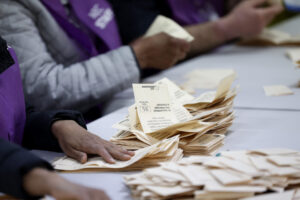Election entrée: Not all party candidates make it to election day

Sometimes parties part ways with their candidates.
This leads to messy disendorsements and a flurry of bad press. When these disendorsements happen late (after the “close of nominations”, after which no new candidates are accepted), the candidate still appears on the ballot as a member of the party that disendorsed them.
Such was the case for Pauline Hanson, who won the 1996 election while listed as a Liberal candidate. The Queensland Liberals expelled her only after nominations had closed in response to highly controversial comments she made to local journalists about Aboriginal issues. Hanson was one of five independents elected in 1996, including others who quit or were expelled from their political party.
Other times, candidates are disendorsed before the close of nominations – which means the party can choose a replacement candidate. In 2016, the seat of Fremantle lost both its Liberal and its Labor candidates, the former for controversial statements about Indigenous politics and same-sex marriage, and the latter for failing to disclose previous criminal convictions concerning drink driving and assaulting a police officer. The replacement Labor candidate, Josh Wilson, won the seat and holds it to this day.
At the upcoming election, three former party MPs are defending their seats: Andrew Gee, who left the Nationals in protest over their opposition to the Voice; and Russell Broadbent and Ian Goodenough who quit the Liberal Party after losing pre-selection.
While a regrettably large number of disendorsements occur for racist, sexist or homophobic comments, Murray Angus has the distinction of losing his Liberal candidacy for the seat of Corio for speaking too warmly of his opponent, Labor’s Richard Marles.
Between the Lines Newsletter
The biggest stories and the best analysis from the team at the Australia Institute, delivered to your inbox every fortnight.
You might also like
Eight things you need to know about the Government’s plan to change Australian elections
And eight ideas to improve it
There is no such thing as a safe seat | Fact sheet
A notable trend in Australian politics has been the decline of the share of the vote won by both major parties at federal elections. One effect of this is that there are no longer any safe seats in Australian politics: minor parties and independents win more “safe” seats than they do “marginal” ones. The declining
Full preferential voting means you can’t waste your vote
Full preferential voting is a proud Coalition reform – one that benefits every political persuasion Compulsory voting and full preferential voting make up the backbone of Australian democracy, and protect us from voter suppression and disengagement seen in other countries. We owe both to the parties of the centre-right, what would become the Liberal–National Coalition.



